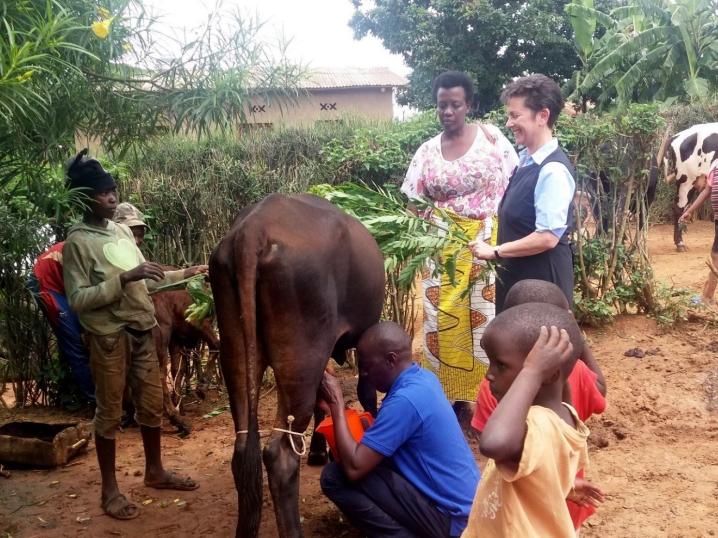Education Will Give My Children a Better Life

This World Day Against Child Labour, we take a look at the role that microfinance plays in ensuring that children are free to attend school and do what children do instead of having to work to support their families.
Johanna Ryan, VisionFund’s Global Director of Impact recounts a recent visit to Rwanda, where she met Agnes.
As children, Agnes and her husband did not get a chance to complete their education as they had to go to work to help support their families. Agnes was 12 years old when she had to leave school, and her husband, Noël, was 15. But she is determined that her children will attend school and that their lives will be very different to their parents’.
Agnes lives in Nyamata, about 90 minutes south of Kigali, the capital city of Rwanda. It appears to be a thriving community, with brightly painted shops along the paved road, and many bicycles and motorcycles transporting people and goods. Each house has electricity and a stand pipe providing clean water. As everywhere in Rwanda during the rainy season, the predominant colour is the vibrant green of bananas, cassava and sweet potatoes.
The family’s income comes from five very different businesses. Agnes’ main enterprise is a stall selling clothes at the local market. Her husband also has a stall in the same market selling various types of flour. Together, they own a farm of about one hectare. They also have 13 dairy cows and 30 goats.
Given that the family has six children, Agnes is constantly busy, juggling with her husband the responsibility for the livestock, which, along with the garden, are about 5 km away from her home. They have a motorcycle for this, which helps with the delivery of the milk and all the stock for their shops.
For the last four years, Agnes has made use of business loans from VisionFund Rwanda to develop her multiple livelihoods, mostly for buying stock for the shops. These businesses are increasingly profitable, and Agnes has a clear vision for how she wants to develop them further.
Yet the family’s rise in income is not the main story. The real story is about the children. Agnes and Noël have four biological children, “Boy” (8); Arberic (12), Dianne (15), and Noella (17). All four attend school locally, with the eldest in boarding school – which costs them just under $600 a year. The expense is justified to her parents because of her results in the national exam, which gave her access to one of the country’s best secondary schools. She will go on to university to study medicine, which will be funded by a loan from the government. Agnes and Noël plan to repay the university loan from the sale of animals or other assets.
Education, says Agnes, will give all her children a very different when compared to hers. Once they have completed senior school, they will have good skills, and they should be able to obtain good jobs. Agnes has paid the school fees from her business profits. The family’s food and healthcare has also improved – but it is school fees that Agnes is most concerned about.
As she is talking, two more children come into the room. They are Gillay (3) and Fis (14). Both are orphaned relatives whom Agnes and Noël have adopted. All six children will complete their education to, at least, senior school because Agnes and Noël have profitable businesses. That is prosperity.
Including the casual labour, Agnes and Noël employ five people, and they also provide a home to two of their employees. This is how prosperity extends to the community.

Despite her lack of formal schooling, Agnes has received business training through a government-sponsored programme, the certificate has pride of place in her home. She also has a full-time mentor in her VisionFund loan officer, Valentine. Agnes believes that the training and advice from Valentine are almost more valuable than the loan.. She says it is very important to have a female loan officer because women understand all the problems better than men. They know about the difficulties with children and all the other work.
Agnes and her husband make all the financial decisions together, and have a shared plan to increase their productivity further. In the coming years, when the children grow up, the burden of school fees will reduce, allowing them to move out of the market into road-side shops, providing businesses for each of their children to inherit.
Recent storms have damaged their home and renovating could have been a financial disaster, but because Agnes’ businesses are so productive, she is resilient to these shocks and has the resources to rebuild her house. She was able to send all her children to school; to adopt two orphans; and to employ five young people from the local community. This is how microfinance has paved the way to prosperity for one family.
This is economic development at the grass roots, and it all began with a small loan to a promising entrepreneur.